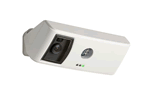The SecNurse sends an alarm to the existing nurse call system when the sensor detects that someone has left the bed, caused for example, by a fall or wandering. However, the SecNurse also can send this alarm after a specified time. For instance, if the patient has not returned to bed within 10 minutes. The time interval can be set according to the level of care required for each individual patient.
 The SecNurse is easy to install, can be placed everywhere (both permanent as ambulant), is easy to integrate in each nurse call system, maintenance free, hygienic and does not need physical contact with the patient.
The SecNurse is easy to install, can be placed everywhere (both permanent as ambulant), is easy to integrate in each nurse call system, maintenance free, hygienic and does not need physical contact with the patient.
The camera technique used in the SecNurse is used for monitoring and interpretation within the sensor itself. No video images are provided. The only output contacts are two simple relays. The SecNurse reduces false alarms and is also a cost-efficient alternative, which offers a lot of short-term advantages for the care organisation and a positive balance on the budget at the mid-term.
For further information, please visit:
www.secumatic.nl
About Secumatic
Secumatic is a company active as a supplier to the automatic door, gate and elevator market. It brings technical excellence and innovation together in a company that is pro active, efficient and people friendly. The SecNurse is an innovative and new Secumatic product for applications in care homes, nursing homes and hospitals.